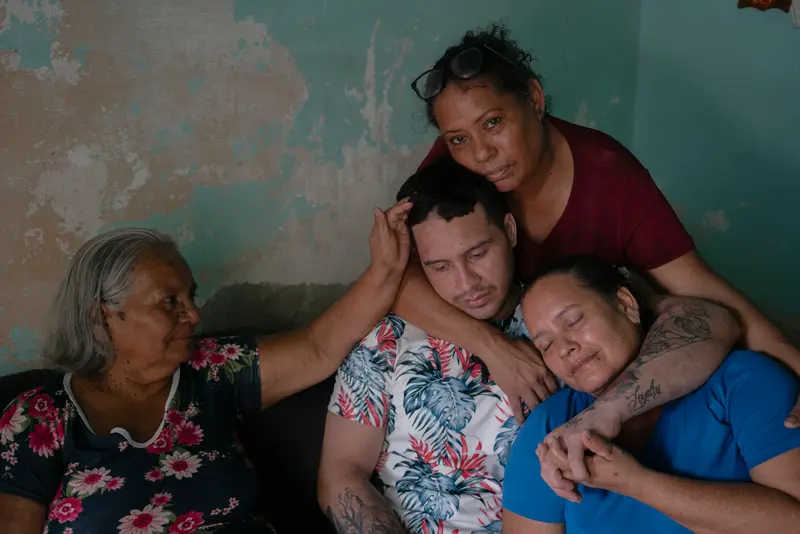ProPublica is a nonprofit newsroom that investigates abuses of power. This story was originally published in our Dispatches newsletter; sign up to receive notes from our journalists.
In the early days of President Donald Trump’s second term, I spent a few weeks observing Chicago’s immigration court to get a sense of how things were changing. One afternoon in March, the case of a 27-year-old Venezuelan asylum-seeker caught my attention.
Albert Jesús Rodríguez Parra stared into the camera at his virtual bond hearing. He wore the orange shirt given to inmates at a jail in Laredo, Texas, and headphones to listen to the proceedings through an interpreter.
More than a year earlier, Rodríguez had been convicted of shoplifting in the Chicago suburbs. But since then he had seemed to get his life on track. He found a job at Wrigley Field, sent money home to his mom in Venezuela and went to the gym and church with his girlfriend. Then, in November, federal authorities detained him at his apartment on Chicago’s South Side and accused him of belonging to the Venezuelan gang Tren de Aragua.
“Are any of your tattoos gang related?” his attorney asked at the hearing, going through the evidence laid out against him in an Immigration and Customs Enforcement report. “No,” said Rodríguez, whose tattoos include an angel holding a gun, a wolf and a rose. At one point, he lifted his shirt to show his parents’ names inked across his chest.
He was asked about a TikTok video that shows him dancing to an audio clip of someone shouting, “Te va agarrar el Tren de Aragua,” which means, “The Tren de Aragua is going to get you,” followed by a dance beat. That audio clip has been shared some 60,000 times on TikTok — it’s popular among Venezuelans ridiculing the stereotype that everyone from their country is a gangster. Rodríguez looked incredulous at the thought that this was the evidence against him.
That day, the judge didn’t address the gang allegations. But she denied Rodríguez bond, citing the misdemeanor shoplifting conviction. She reminded him that his final hearing was on March 20, just 10 days away. If she granted him asylum, he’d be a free man and could continue his life in the U.S.
I told my editors and colleagues about what I’d heard and made plans to attend the next hearing. I saw the potential for the kind of complicated narrative story that I like: Here was a young immigrant who, yes, had come into the country illegally, but he had turned himself in to border authorities to seek asylum. Yes, he had a criminal record, but it was for a nonviolent offense. And, yes, he had tattoos, but so do the nice, white American moms in my book club. I was certain there are members of Tren de Aragua in the U.S., but if this was the kind of evidence the government had, I found it hard to believe it was an “invasion” as Trump claimed. I asked Rodríguez’s attorney for an interview and began requesting police and court records.
Five days later, on March 15, the Trump administration expelled more than 230 Venezuelan men to a maximum security prison in El Salvador, a country many of them had never even set foot in. Trump called them all terrorists and gang members. It would be a few days before the men’s names would be made public. Perhaps naively, it didn’t occur to me that Rodríguez might be in that group. Then I logged into his final hearing and heard his attorney say he didn’t know where the government had taken him. The lawyer sounded tired and defeated. Later, he would tell me he had barely slept, afraid that Rodríguez might turn up dead. At the hearing, he begged a government lawyer for information: “For his family’s sake, would you happen to know what country he was sent to?” She told him she didn’t know, either.
Credit:
Andrea Hernández Briceño for ProPublica
I was astonished. I am familiar with the history of authoritarian leaders disappearing people they don’t like in Latin America, the part of the world that my family comes from. I wanted to think that doesn’t happen in this country. But what I had just witnessed felt uncomfortably similar.
As soon as the hearing ended, I got on a call with my colleagues Mica Rosenberg and Perla Trevizo, both of whom cover immigration and had recently written about how the U.S. government had sent other Venezuelan men to Guantanamo. We talked about what we should do with what I’d just heard. Mica contacted a source in the federal government who confirmed, almost immediately, that Rodríguez was among the men that our country had sent to El Salvador.
The news suddenly felt more real and intimate to me. One of the men sent to a brutal prison in El Salvador now had a name and a face and a story that I had heard from his own mouth. I couldn’t stop thinking about him.
As a news organization, we decided to put significant resources into investigating who these men really are and what happened to them, bringing in many talented ProPublica journalists to help pull records, sift through social media accounts, analyze court data and find the men’s families. We teamed up with a group of Venezuelan journalists from the outlets Alianza Rebelde Investiga and Cazadores de Fake News who were also starting to track down information about the men.
We spoke to the relatives and attorneys of more than 100 of the men and obtained internal government records that undercut the Trump administration’s claims that all the men are “monsters,” “sick criminals” and the “worst of the worst.” We also published a story about how, by and large, the men were not hiding from federal immigration authorities. They were in the system; many had open asylum cases like Rodríguez and were waiting for their day in court before they were taken away and imprisoned in Central America.
On July 18 — after I’d written the first draft of this note to you — we began to hear some chatter about a potential prisoner exchange between the U.S. and Venezuela. Later that same day, the men had been released. We’d been in the middle of working on a case-by-case accounting of the Venezuelan men who’d been held in El Salvador. Though they’d been released, documenting who they are and how they got caught up in this dragnet was still important, essential even, as was the impact of their incarceration.
The result is a database we published last week including profiles of 238 of the men Trump deported to a Salvadoran prison.
From the moment I heard about the men’s return to Venezuela, I thought about Rodríguez. He’d been on my mind since embarking on this project. I messaged with his mother for days as we waited for the men to be processed by the government of Nicolás Maduro and released to their families.

Credit:
Andrea Hernández Briceño for ProPublica
Finally, one morning last week, he went home. We spoke later that afternoon. He said he was relieved to be home with his family but felt traumatized. He told me he wants the world to know what happened to him in the Salvadoran prison — daily beatings, humiliation, psychological abuse. “There is no reason for what I went through,” he said. “I didn’t deserve that.”
The Salvadoran government has denied mistreating the Venezuelan prisoners.
We asked the Trump administration about its evidence against Rodríguez. This is the entirety of its statement: “Albert Jesús Rodriguez Parra is an illegal alien from Venezuela and Tren de Aragua gang member. He illegally crossed the border on April 22, 2023, under the Biden Administration.”
While Rodríguez was incarcerated in El Salvador and no one knew what would happen to him, the court kept delaying hearings for his asylum case. But after months of continuances, on Monday, Rodríguez logged into a virtual hearing from Venezuela. “Oh my gosh, I am so happy to see that,” said Judge Samia Naseem, clearly remembering what had happened in his case.
Rodríguez’s attorney said that his client had been tortured and abused in El Salvador. “I can’t even describe to this court what he went through,” he said. “He’s getting psychological help, and that’s my priority.”
It was a brief hearing, perhaps five minutes. Rodríguez’s lawyer mentioned his involvement in an ongoing lawsuit against the Trump administration over its use of the Alien Enemies Act to deport Venezuelans. The government lawyer said little, except to question whether Rodríguez was even allowed to appear virtually due to “security issues” in Venezuela.
Finally, the judge said she would administratively close the case while the litigation plays out. “If he should hopefully be able to come back to the U.S., we’ll calendar the case,” she said.
Naseem turned to Rodríguez, who was muted and looked serious. “You don’t have to worry about reappearing until this gets sorted out,” she told him. He nodded and soon logged off.
We plan to keep reporting on what happened and have another story coming soon about Rodríguez and the other men’s experiences inside the prison. Please reach out if you have information to share.
Great Job by Melissa Sanchez & the Team @ ProPublica Source link for sharing this story.





